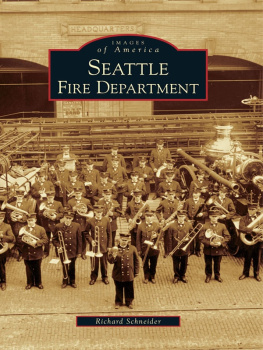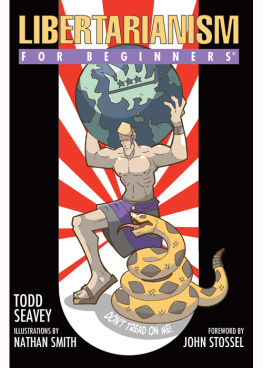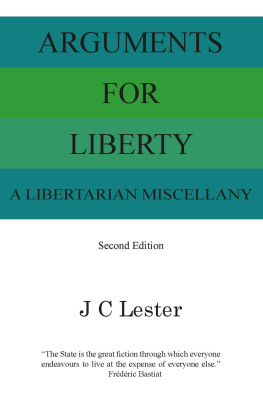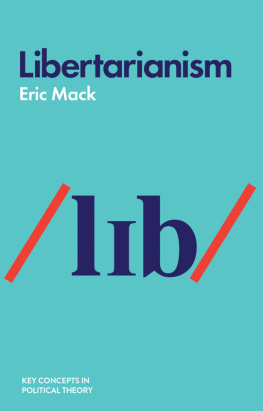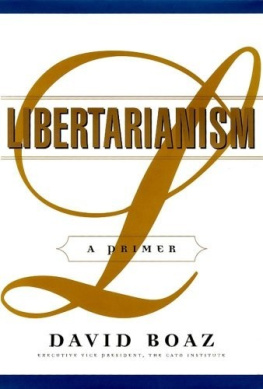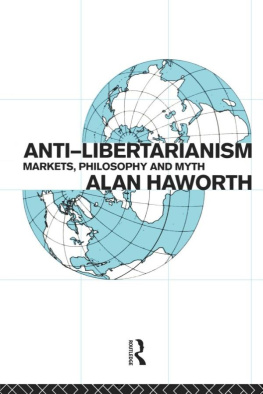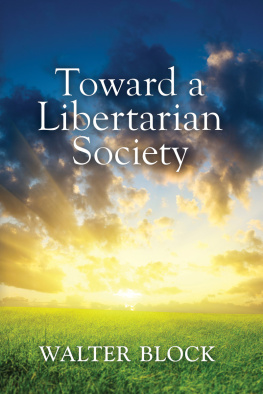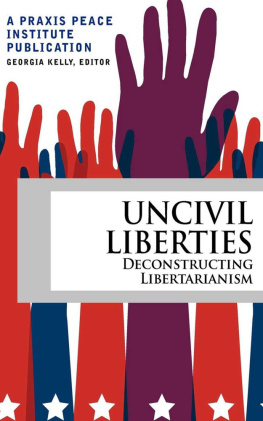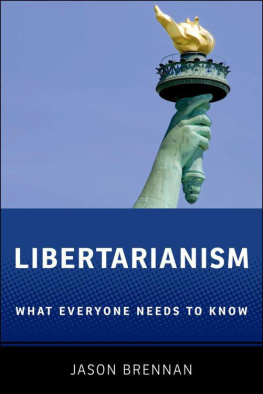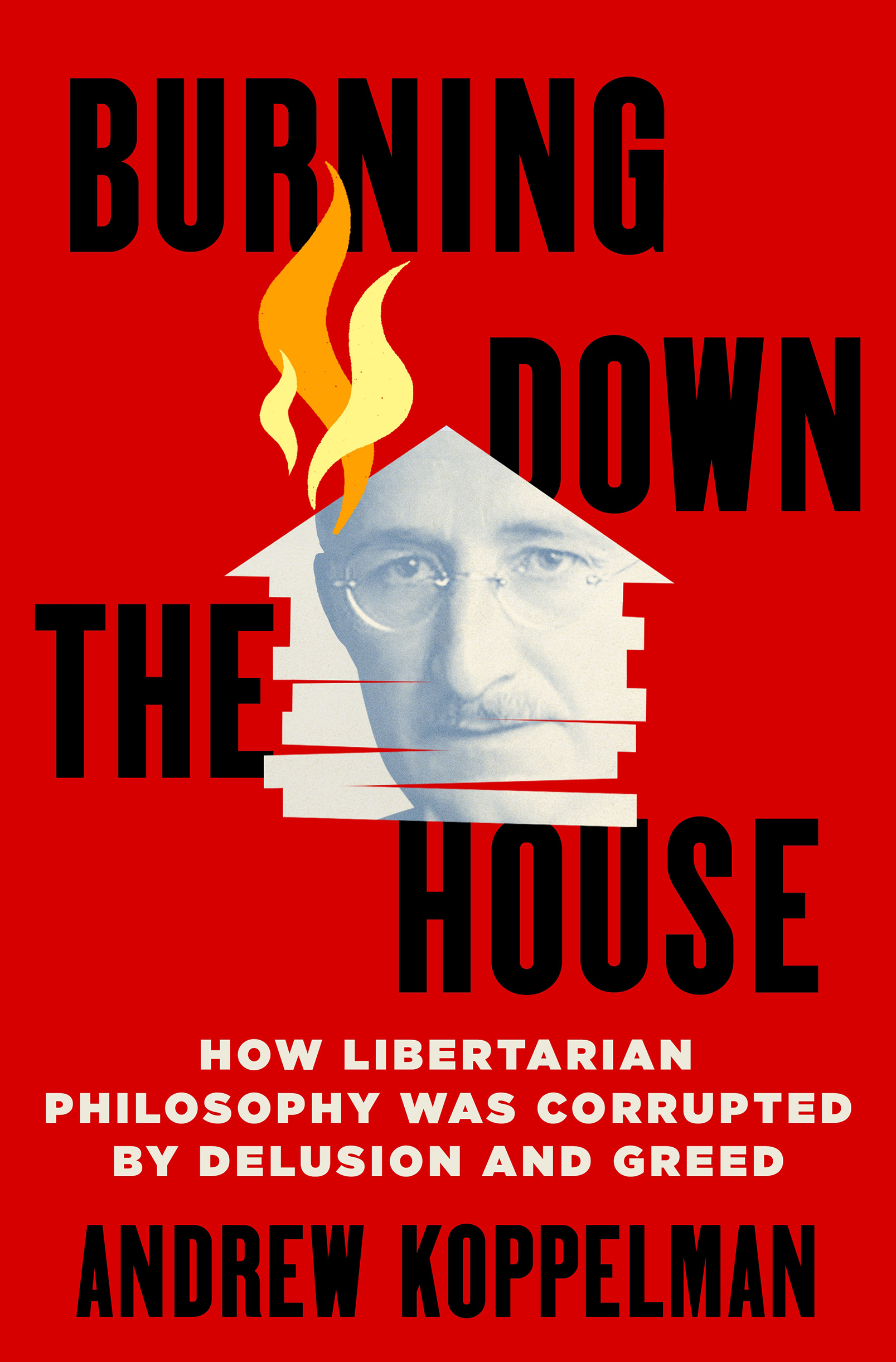Contents
Guide
Pagebreaks of the print version
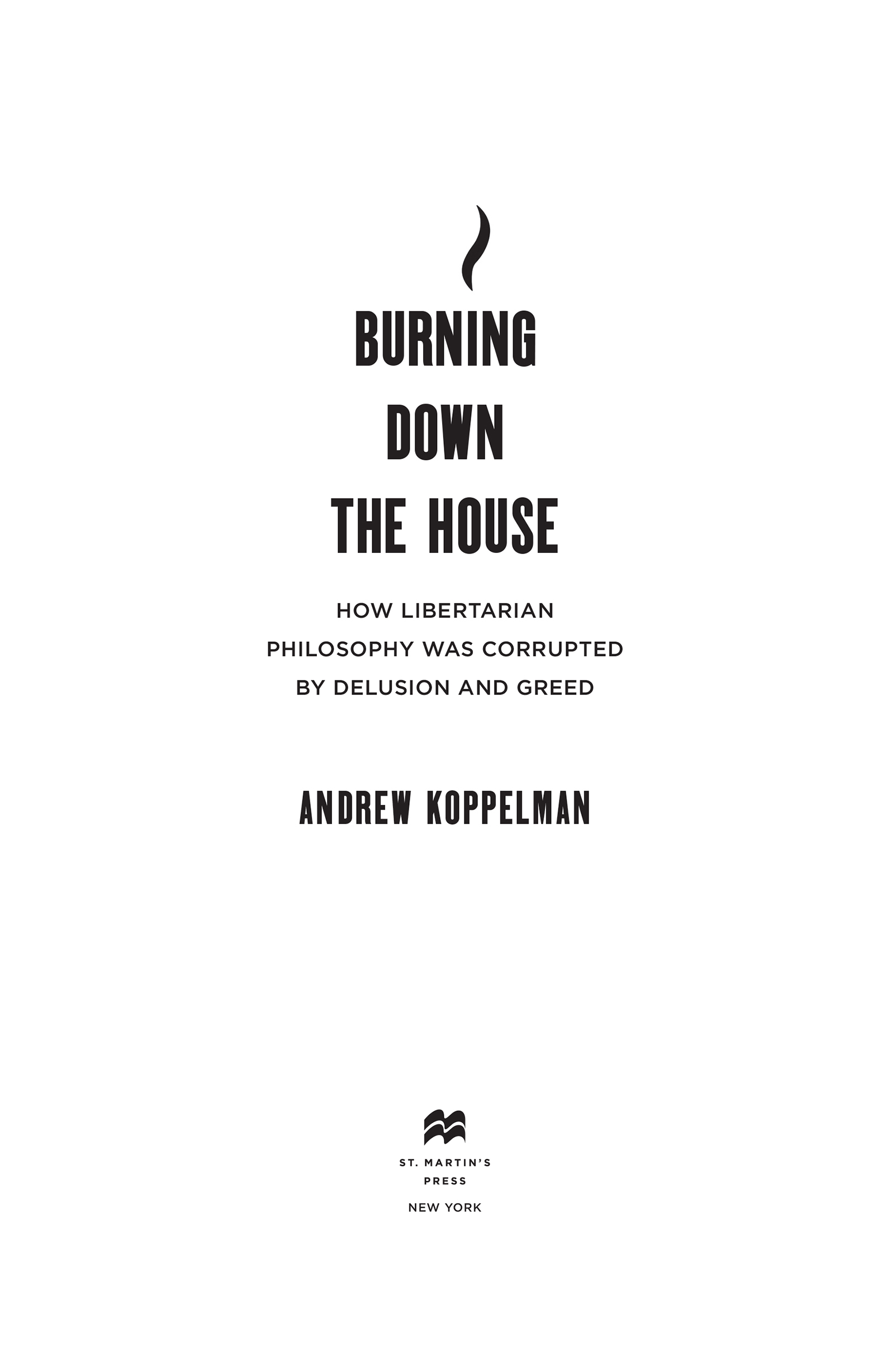
The author and publisher have provided this e-book to you for your personal use only. You may not make this e-book publicly available in any way. Copyright infringement is against the law. If you believe the copy of this e-book you are reading infringes on the authors copyright, please notify the publisher at: us.macmillanusa.com/piracy.
For Ruby and George, again. I think they would have been pleased.
So far as direct influence on current affairs is concerned, the influence of the political philosopher may be negligible. But when his ideas have become common property, through the work of historians and publicists, teachers and writers, and intellectuals generally, they effectively guide developments.
Friedrich Hayek
The fire department was run by idealists. That is why it ignored the homeowners pleas and watched his house burn down.
He had neglected to pay his bill. What happened then tells us a lot about libertarianism, the increasingly influential philosophy of minimal government. Many libertarians took it to show the stern seriousness of their ideal. Their enemies on the left thought it revealed how repugnant it is to leave such important matters to the market. Both sides thought that it revealed the essence of the libertarian tradition. Both were wrong.
Obion County, Tennessee, uses the fire protection services of the nearby City of South Fulton. But the county doesnt contract with the city on behalf of all its residents. It leaves them each to pay a seventy-five-dollar fee to the city. Fire protection in the county is essentially privatized: it is up to individual homeowners to contract with the city fire department.
Gene Cranick, who lives in Obion County, had paid the fee for years. In 2010 he forgot. His grandson burned some trash in his backyard, and the fire got out of control and began to spread. Cranick called 911, but the operator told him the fire department would not come. His wife told the operator that she would pay whatever the cost, but that was not an option. The department arrived several hours later, when the fire threatened the house of a neighbor who had paid. It sprayed the neighbors land up to, but not across, Cranicks property line. Three dogs and a cat died. Cranicks son punched the fire chief and was arrested.
Glenn Beck, the conservative radio and television host, explained why the department had done the right thing. In America, we are going to start to have to have these kinds of things. It would have been wrong to put out the fire. If you dont pay your seventy-five dollars, then that hurts the fire department. They cant use those resources and you would be sponging off of your neighbors seventy-five dollars. Soon there would be no fire protection: As soon as they put out the fire of somebody who didnt pay the seventy-five bucks, no one will pay the seventy-five bucks.
The fire chief was not, so far as is known, an ideologue or a philosopher. But the decision to let the house burn reflected two key tenets of libertarianism: that people are appropriately understood to be on their own in the world, responsible for their own fate, and that need does not make a claim on others resources. Beck thought that the fire illustrated the importance of those principles, and that those principles had implications for the then-pressing debate about Obamacare: its protection of people with preexisting medical conditions created the same perverse incentives that saving Cranicks house would. The same principle demanding that houses be allowed to burn also entailed that millions of people should be allowed to go without health care.
The broader philosophy that Beck embraces would radically transform our society. In modern America, government protects people from not only fire and disease but also dangerous workplace conditions and toxins in the environment. It provides education, maintains roads and bridges, funds medical research and disaster relief. It protects against destitution through Social Security, unemployment insurance, and food stamps. Obamacare built upon Medicare and Medicaid.
The most influential forms of libertarianism aim to radically curtail all of these in order to lower taxes, particularly taxes on the most prosperous Americans. I dont want to abolish government, Grover Norquist, the president of Americans for Tax Reform, told National Public Radio in a 2001 interview. I simply want to reduce it to the size where I could drag it into the bathroom and drown it in the bathtub. Were its ideal realized, there would be a lot of Gene Cranicks: people who discover that they can no longer rely on the government to protect them. The party did not always endorse that ideal. This development is the result of an intellectual movement.
Within Obion County, there is disagreement about how the tax burden should be apportioned: farmers dont want their taxes raised to protect homes from fire. There is a persistent squeamishness about the tough discipline that was administered to Cranick.
The individual firefighters were troubled. Most everybody has been compassionate and neighborly, Cranick told a reporter. I understood some of the firefighters went home and were sick. Some of them even cried over it. His wife, Paulette, said, You cant blame them if they have to do what the boss says to do. Ive had firemen call and apologize.
But perhaps those firefighters just didnt understand that doing whats right can be hard. Beck and Goldberg argued that letting the house burn would make America into a better, more self-reliant society.
Beck described Cranick as though he were deliberately sponging. Kevin Williamson, in National Review Online, wrote: The world is full of jerks, freeloaders, and ingratesand the problems they create for themselves are their own. The implications of Becks views are harsher than he realizes. Suppose there were children in the house. If the firefighters rescued them, wouldnt that also create perverse incentives, encouraging other parents to sponge?
Leftists sneer at Glenn Beck. But he is a smart man who is good at his job. Journalism is an intensely competitive business, and he has been a remarkable success. His ideas matter. They have a huge constituency. He knows how to mirror and shape the moral convictions of much of contemporary America.
Libertarianism takes multiple forms. The kind that let the house burn is a corrupted variety. Libertarians once defended free markets, and the inequalities that markets inevitably generate, without claiming that those inequalities are deserved or that peoples needs count for nothing. Free markets were valuable precisely because they offered the most promising path toward satisfying the needs of the worst off. Its commitments did not include letting houses burn.
This valid core of libertarianism has prevailed across the political spectrum, so completely that the label libertarian is no longer meaningful as a way to describe it. What was valid in libertarianism has been assimilated into mainstream liberalism. Except for a politically impotent fringe, the American left aims for a generous welfare statemore generous than the present onein the context of capitalism. Although Senator Bernie Sanders calls himself a socialist, he envisions an economy in which you have wealth being created by the private sector, but you have a fair distribution of that wealth, and you make sure the most vulnerable people in this country are doing well. The American right, too, has embraced the welfare state in some form. Few Republicans propose to abolish Medicare or Social Security.


